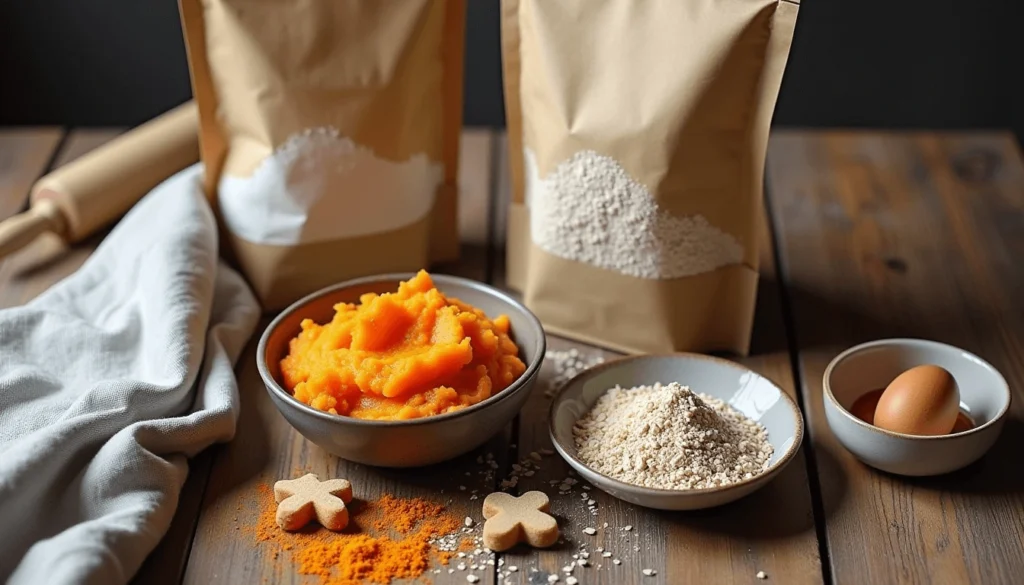Can Dogs Eat Seaweed? 2 Easy Recipes to Try
Table of Contents
Can Dogs Eat Seaweed? What Pet Owners Need to Know
If you’ve ever snacked on sushi rolls or seaweed crisps, you might’ve wondered: “Can dogs eat seaweed too?” The answer is yes—but with some big caveats. While certain types of seaweed offer health perks for pups, others can be dangerous. Let’s dive into what every dog owner needs to know before sharing this oceanic snack with their furry friend.
Nutritional Benefits of Seaweed for Dogs
Seaweed isn’t just a trendy superfood for humans—it’s packed with nutrients that can boost your dog’s health! Here’s a closer look at why it’s worth considering:
- Vitamins Galore:
Seaweed is rich in vitamin A (supports vision and skin health), vitamin C (boosts immunity), and B vitamins (keeps energy levels steady). - Digestive Support:
The high fiber content aids digestion, which is especially helpful for dogs with sensitive stomachs. - Omega-3 Powerhouse:
Fatty acids in seaweed reduce inflammation, promote a shiny coat, and support joint health—perfect for older dogs or breeds prone to arthritis. - Natural Detoxifier:
Seaweed contains chlorophyll, which helps flush toxins from your dog’s body.
Pro Tip: A sprinkle of dried, organic seaweed powder on your dog’s kibble can add nutrients without overpowering their meal.
Potential Risks of Feeding Seaweed to Dogs
While seaweed has perks, it’s not risk-free. Here’s what to watch out for:
- Salt Overload:
Store-bought seaweed snacks (like those meant for humans) often contain excessive salt, which can lead to dehydration or kidney strain. - Heavy Metals:
Seaweed absorbs minerals from the ocean, including arsenic or lead, depending on where it’s harvested. Always choose brands that test for contaminants. - Choking Hazards:
Dried seaweed sheets can swell in your dog’s stomach, causing blockages. Always break it into small pieces or grind it into powder. - Thyroid Issues:
Too much iodine (found in kelp) can disrupt thyroid function. Stick to small, occasional servings.
Key Takeaway: Quality and moderation are crucial!
Safe Types of Seaweed for Dogs (And What to Avoid)

Dog-Friendly Seaweed Varieties
Not all seaweed is created equal. Stick to these vet-approved options:
- Nori:
The seaweed used in sushi is safe for dogs if it’s unsalted, unseasoned, and organic. Look for plain, toasted nori sheets. - Kelp:
Dried kelp flakes are rich in iodine—ideal for small doses. Use sparingly (½ tsp per week for medium dogs). - Dulse:
This red seaweed is high in iron and potassium. Avoid smoked varieties, which may contain harmful additives.
Toxic Seaweed and Seasonings to Avoid
- Wild Seaweed:
Avoid seaweed washed up on beaches—it may be contaminated with pollutants, parasites, or rotting debris. - Seasoned Blends:
Garlic, onion, soy sauce, or MSG in flavored seaweed snacks are toxic to dogs. - Kombu and Hijiki:
These varieties are extremely high in iodine and arsenic, making them unsafe for pets.
Shopping Tip: Buy seaweed labeled “for pet consumption” or from trusted organic brands like The Honest Kitchen or Wysong.
How to Prepare Seaweed Safely for Your Dog
Washing and Cooking Tips
- Rinse Thoroughly:
Soak fresh or dried seaweed in cold water for 10 minutes to remove sand, salt, or debris. - Cook Plain:
Steam or boil seaweed without oils, butter, or spices. For dried varieties, lightly toast it in the oven (250°F for 5 minutes) to enhance crunch. - Grind for Safety:
Use a coffee grinder to turn dried seaweed into a powder. This prevents choking and makes it easier to mix into food.
Recommended Serving Sizes and Frequency
- Small Dogs (under 20 lbs):
¼ tsp of seaweed powder, 1–2 times per week. - Medium Dogs (20–50 lbs):
½ tsp, 2–3 times weekly. - Large Dogs (50+ lbs):
1 tsp, up to 3 times weekly.
Never Exceed: 1 tablespoon per week for any dog, as too much iodine can cause thyroid imbalances.
2 Easy Seaweed Recipes Your Dog Will Love
Recipe 1: Simple Seaweed & Sweet Potato Dog Treats

Why Dogs Love It: Sweet potatoes are gentle on tummies, and seaweed adds a savory umami flavor.
Ingredients:
- 1 cup mashed sweet potato (no skin)
- ½ cup oat flour (or coconut flour for grain-free pups)
- 1 tbsp crushed organic nori
- 1 egg (optional for binding)
Step-by-Step Instructions:
- Preheat oven to 350°F and line a baking sheet with parchment paper.
- Mix all ingredients in a bowl until a dough forms. Add water if too dry.
- Roll dough into ½-inch balls, flatten with a fork, and bake for 20–25 minutes.
- Let cool completely. Store in an airtight container for up to 2 weeks.
Serving Suggestion: Crumble over kibble for picky eaters!
Recipe 2: Salmon & Seaweed Meal Topper

Why Dogs Love It: Salmon provides omega-3s, and seaweed adds a nutrient boost.
Ingredients:
- ½ cup cooked salmon (skinless, boneless)
- 1 tsp dried kelp flakes
- 2 tbsp plain Greek yogurt (or pumpkin puree for dairy-free)
- 1 tsp flaxseed (optional)
Step-by-Step Instructions:
- Flake salmon into small, bite-sized pieces.
- Mix salmon with kelp, yogurt, and flaxseed in a bowl.
- Spoon 1–2 tbsp over your dog’s regular food.
Storage: Keep leftovers in the fridge for up to 3 days.
FAQs About Dogs and Seaweed
Can Puppies Eat Seaweed?
Puppies under 6 months old should avoid seaweed. Their developing digestive systems and thyroid glands are extra sensitive. Stick to puppy-formulated food until they’re older!
What If My Dog Ate Too Much Seaweed?
Watch for symptoms like:
- Vomiting or diarrhea
- Excessive thirst
- Swollen abdomen
- Lethargy
Act Fast: Contact your vet immediately. Bring the seaweed packaging (if possible) to help identify toxins.
Can Dogs Eat Seaweed Supplements?
Yes, but choose supplements made specifically for pets. Human-grade seaweed pills may contain unsafe additives or excessive iodine.
Final Thoughts on Seaweed as a Dog-Friendly Snack
Balancing Variety in Your Dog’s Diet
Think of seaweed as a occasional supplement, not a meal replacement. Rotate it with other healthy toppers like blueberries, carrots, or plain chicken.
When to Consult Your Vet
Always check with your vet before introducing seaweed if your dog:
Takes medication (iodine can interact with some drugs)
Has thyroid issues
Is pregnant or nursing

